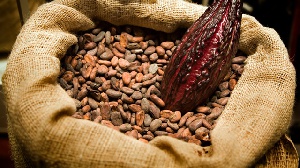 There were reports that 100 tonne of cocoa from Ghana was rejected because it contained herbicide
There were reports that 100 tonne of cocoa from Ghana was rejected because it contained herbicide
COCOBOD, has dispelled a report that Japan rejected Ghana’s cocoa because it did not meet the Japanese Food Sanitation Law, following the detection of 2, 4-D – a herbicide.
The herbicide was detected as part of a 100-ton consignment to Japan in July 2017. But COCOBOD, said that did not result in the rejection of that consignment.
“The consignment in question was not returned to Ghana. It was not rejected as being alleged by the Chronicle newspaper,” COCOBOD said in a press statement.
Read the full press statement below:
Our attention has been drawn to a publication in the 24th January 2018 edition of the Chronicle newspaper headlined, ‘Japan rejects Ghana’s Cocoa’.
The publication stated that Ghana’s cocoa beans sold to Japan did not meet the Japanese Food Sanitation Law following the detection of 2, 4-D.
Management of Ghana Cocoa Board (COCOBOD) wishes to clarify the issues raised as follows:
Since 2008, the Chocolate and Cocoa Association of Japan (CCAJ) agreed with Ghana Cocoa Board (COCOBOD) to establish protocols for testing chemical residues on cocoa for shipment to that country.
The attention of COCOBOD was drawn to a 100-ton consignment to Japan in which 2, 4-D was detected in July, 2017.
2, 4-D which is a herbicide was not part of the critical chemicals being tested for, for Japanese Shipment prior to the June, 2017 encounter.
Following that alert from CCAJ on the detection of 2, 4-D, the Quality Control Company, a Subsidiary of COCOBOD working with experts from CCAJ agreed on testing protocols for the 2,4-D which later became part of the total testing processes before cocoa is shipped to Japan.
Subsequently, Ghana and Japan have continued to do business to the mutual benefits of both countries. Japan has since received over 42,000mt of cocoa from Ghana without any issue in respect of a breach of any of the testing protocols.
The consignment in question was not returned to Ghana. It was not rejected as being alleged by the Chronicle newspaper.
COCOBOD would like to make it clear that it does not and has not given out or subscribed to the use of herbicides by cocoa farmers as a means of weeds control.
ACTION:
Staff of the Cocoa Health & Extension Division (CHED) and Quality Control Company (QCC) have intensified farmer-education on the appropriate use of weedicides/herbicides on cocoa farms (thus, if farmers wish to control weeds by that means).
The Chief Executive at various field interactions with cocoa farmers has repeatedly cautioned cocoa farmers against the use of unapproved chemicals in cocoa farming.
Indeed, he has also continuously encouraged cocoa farmers to desist from using herbicides for the control of weeds, particularly on mature cocoa farms.
CONCLUSION
We wish to entreat our cherished cocoa farmers to abide by the rich extension services being offered by staff of CHED and QCC and also remain calm since there is no cause for alarm. COCOBOD will continue to ensure that it maintains the niche it has carved for itself over the past 70 years as the producer of best quality cocoa beans the world over.